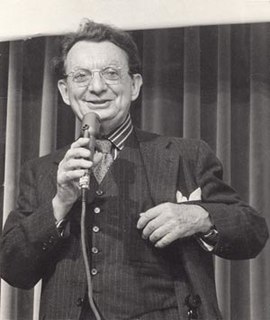A Quote by Andrew Dickson White
Just as the line of astronomical thinkers from Copernicus to Newton had destroyed the old astronomy, in which the earth was the center, and the Almighty sitting above the firmament the agent in moving the heavenly bodies about it with his own hands, so now a race of biological thinkers had destroyed the old idea of a Creator minutely contriving and fashioning all animals to suit the needs and purposes of man.
Related Quotes
An old market had stood there until I'd been about six years old, when the authorities had renamed it the Olde Market, destroyed it, and built a new market devoted to selling T-shirts and other objects with pictures of the old market. Meanwhile, the people who had operated the little stalls in the old market had gone elsewhere and set up a thing on the edge of town that was now called the New Market even though it was actually the old market.
His [Turgot's] first important literary and scholastic effort was a treatise On the Existence of God. Few fragments of it remain, but we are helped to understand him when we learn that he asserted, and to the end of his life maintained, his belief in an Almighty Creator and Upholder of the Universe. It did, indeed, at a later period suit the purposes of his enemies, exasperated by his tolerant spirit and his reforming plans, to proclaim him an atheist; but that sort of charge has been the commonest of missiles against troublesome thinkers in all times.
We find it hard to picture to ourselves the state of mind of a man of older days who firmly believed that the Earth was the centre of the Universe, and that all the heavenly bodies revolved around it. He could feel beneath his feet the writhings of the damned amid the flames; very likely he had seen with his own eyes and smelt with his own nostrils the sulphurous fumes of Hell escaping from some fissure in the rocks. Looking upwards, he beheld ... the incorruptible firmament, wherein the stars hung like so many lamps.
In my beginning is my end. In succession Houses rise and fall, crumble, are extended, Are removed, destroyed, restored, or in their place Is an open field, or a factory, or a by-pass. Old stone to new building, old timber to new fires, Old fires to ashes, and ashes to the earth Which is already flesh, fur and faeces, Bone of man and beast, cornstalk and leaf.
In the index to the six hundred odd pages of Arnold Toynbee's A Study of History, abridged version, the names of Copernicus, Galileo, Descartes and Newton do not occur yet their cosmic quest destroyed the medieval vision of an immutable social order in a walled-in universe and transformed the European landscape, society, culture, habits and general outlook, as thoroughly as if a new species had arisen on this planet.
Since Copernicus, man seems to have got himself on an inclined plane-now he is slipping faster and faster away from the center into-what? into nothingness? into a 'penetrating sense of his nothingness?' ... all science, natural as well as unnatural-which is what I call the self-critique of knowledge-has at present the object of dissuading man from his former respect for himself, as if this had been but a piece of bizarre conceit.
I saw a very old man, literally eating his own human waste out of hunger. I went to the nearby hotel and asked them what was available. They had idli, which I bought and gave to the old man. Believe me, I had never seen a person eating so fast, ever. As he ate the food, his eyes were filled with tears. Those were the tears of happiness.
[About Francis Baily] The history of the astronomy of the nineteenth century will be incomplete without a catalogue of his labours. He was one of the founders of the Astronomical Society, and his attention to its affairs was as accurate and minute as if it had been a firm of which he was the chief clerk, with expectation of being taken into partnership.







































